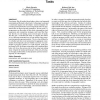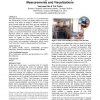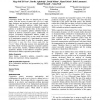109
Voted
CHI
2010
ACM
15 years 9 months ago
2010
ACM
In this paper we argue that “persuasive technologies,” developed to motivate behaviour change in users, have so far failed to exploit the established body of empirical researc...
107
Voted
CHI
2010
ACM
15 years 9 months ago
2010
ACM
Developers, like all modern knowledge workers, are frequently interrupted and blocked in their tasks. In this paper we present a contextual inquiry into developers’ current stra...
130
Voted
CHI
2010
ACM
15 years 9 months ago
2010
ACM
We describe a virtual “tether” for mobile devices that allows groups to have quick, simple and privacy-preserving meetups. Our design provides cues which allow dynamic coordin...
93
Voted
CHI
2010
ACM
15 years 9 months ago
2010
ACM
Tiled-monitor large displays are widely used in various application domains. However, how their interior bezels affect user performance and behavior has not been fully understood....
125
Voted
CHI
2010
ACM
15 years 9 months ago
2010
ACM
This study reports results of an ethnographic action research study, exploring mobile-centric internet use. Over the course of 13 weeks, eight women, each a member of a livelihood...
115
Voted
CHI
2010
ACM
15 years 9 months ago
2010
ACM
Developers spend significant time reading and navigating code fragments spread across multiple locations. The filebased nature of contemporary IDEs makes it prohibitively difficul...
116
click to vote
CHI
2010
ACM
15 years 9 months ago
2010
ACM
This paper describes inAir, a tool for sharing measurements and visualizations of indoor air quality within one’s social network. Poor indoor air quality is difficult for humans...
109
Voted
CHI
2010
ACM
15 years 9 months ago
2010
ACM
It is generally assumed that touch input cannot be accurate because of the fat finger problem, i.e., the softness of the fingertip combined with the occlusion of the target by the...
121
Voted
CHI
2010
ACM
15 years 9 months ago
2010
ACM
Cooperative design has been an integral part of many games. With the success of games like Left4Dead, many game designers and producers are currently exploring the addition of coo...
114
Voted
CHI
2010
ACM
15 years 9 months ago
2010
ACM
In many developing countries such as India and China, low educational levels often hinder economic empowerment. In this paper, we argue that mobile learning games can play an impo...




